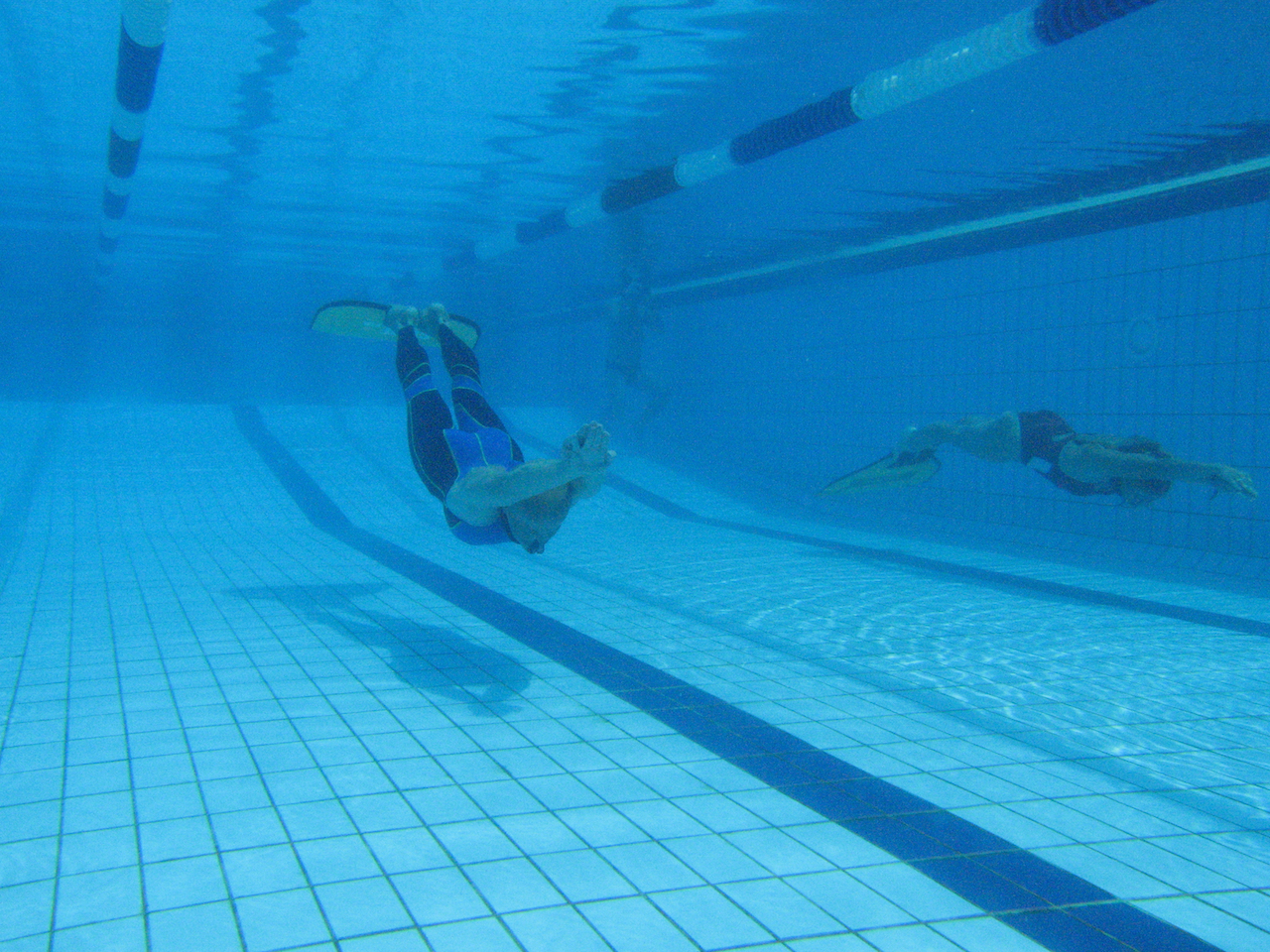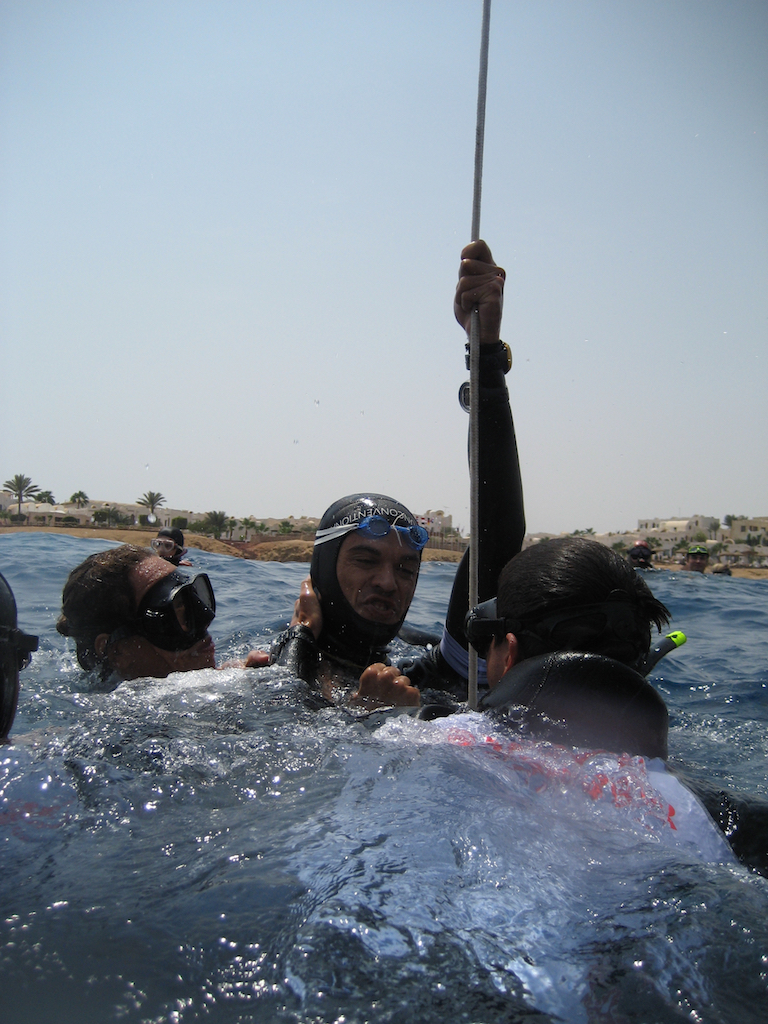Should I ask you to explain freediving to me with the help of feelings and emotions, I am sure the majority of you would tell me about freedom, lightness, relaxation and inner peace. All those positive, pleasant feelings we all experience every time we dive in the sea; feelings we also look for while we train in a swimming pool right in the middle of town. All those feelings which so make us love swimming under water holding our breath, leaving up there, above water, all anxieties, stress, and worries of our daily life. In water our tension melts, our mind becomes liquid and easily finds its inner equilibrium, we relax by concentrating on our breathing pattern; the immersion reflex helps our heartbeat slowing down, and we experience moments of perfect peace and serenity which only recreational freediving can offer.Freediving is also a real sport where athletes compete, and their performances can be measured in meters and seconds in an array of different indoor and outdoor disciplines. This is competitive freediving, the freediving of races and records, the freediving of the great champions we all know and admire, and whose sporting feats are the stuff of our dreams. But that’s not all. It also is the freediving of many amateurs, who, like myself, have no real ambition to compete with the champions, but who nevertheless enjoy entering the races, and in this way measuring their own abilities. It certainly is a much less relaxing way of experiencing freediving: all athletes more or less feel anxiety before a competition, they feel stress at countdown before the start, and tension which pushes their heartbeat up just when they most want to slow it down. I remember a Facebook post by Ciconat who, when talking about dynamic freediving, wrote ‘’I remember watching the athletes who had already competed and envying the fact they’d already finished, they’d already atoned for their sins, and I got to the point where I was watching the spectators who just stood there and didn’t have to feel what I was feeling in that moment’’. How many times did I find myself in the same situation…and how many times did I really want to leave everything a second before the official start and listen to this tiny voice inside my head, which said ‘’What on Earth are you doing here? Why do you put yourself through all this? Run, run away right now!’’.  I have been participating to FIPSAS competitions for 8 years, and the tiny voice inside my head has never stopped tormenting me so. On the basis of these premises, it never was easy to convince any reluctant recreational freediver to try competitive freediving. A recreational freediver facing the perspective of competing, normally goes on to recall those pleasant feelings and those images of freedom and relaxation which I introduced at the beginning of this article, and the answer tends to be ‘’Free diving relaxes me and makes me feel good, whilst competitions are a source of anxiety and stress. Why should I compete?’’.
I have been participating to FIPSAS competitions for 8 years, and the tiny voice inside my head has never stopped tormenting me so. On the basis of these premises, it never was easy to convince any reluctant recreational freediver to try competitive freediving. A recreational freediver facing the perspective of competing, normally goes on to recall those pleasant feelings and those images of freedom and relaxation which I introduced at the beginning of this article, and the answer tends to be ‘’Free diving relaxes me and makes me feel good, whilst competitions are a source of anxiety and stress. Why should I compete?’’.
I am not just about to give you one reason, I am about to give you 4:
1) Competitions are an extraordinary chance to learn and grow. When you compete you need to be, before everything else, attentive observers, because there is always something to learn from carefully watching the strongest athletes and the way they get ready for the competition, the equipment they use, and by analysing their techniques in detail.
 2) Competitions are powerful stimulation for training. It can happen for constant training in the pool in winter to become harder and harder to keep up with; it’s easy to lose the motivation needed to always put maximum effort when we don’t have a specific goal in view. Competitions offer that incentive, the goal to strive towards and on which to focus one’s efforts, and they can help to keep motivation high as to try and achieve the right preparation for the day.
2) Competitions are powerful stimulation for training. It can happen for constant training in the pool in winter to become harder and harder to keep up with; it’s easy to lose the motivation needed to always put maximum effort when we don’t have a specific goal in view. Competitions offer that incentive, the goal to strive towards and on which to focus one’s efforts, and they can help to keep motivation high as to try and achieve the right preparation for the day.
3) Competitions are a unique moment of social gathering. Participating in a competition does not only mean feeling like an athlete, but also feeling part of a team together with your teammates. Part of a community together with all the participants who share your same passion. Each competition becomes a meeting point, a real party.
4) Competitions are a way of measuring one’s own ability. During a freediving competition the athlete, both amateur and professional, measures his/her own abilities against himself/herself more than comparing them against the other competitors. The competition becomes the encouragement needed to better oneself, to find psychological and technical solutions to push our limits, and to overcome anxiety and fear which makes us weaker. Overcoming obstacles gives great satisfaction and great joy. Quoting Ciconat ‘’When I feel satisfaction at the end of a competition, even if I haven’t won, I won against myself, which, although it may not seem much, is the only thing I really care about’’